Nicola Sturgeon has admitted that Scotland’s finances during the year she campaigned for independence were “difficult” as official data showed the country’s deficit deepened to £15bn in 2014-15.
Political opponents have pointed out the contrast between the rosy economic picture the SNP painted during the referendum campaign and newly released official government accounts which showed that total spending in Scotland stood at £68.4bn, compared to tax revenues of £53.4bn including a full geographical share of North Sea oil.
The first minister insisted that Scotland’s underlying economy remains strong and resilient.
Kezia Dugdale, the Scottish Labour leader, said a deficit of that scale would have forced an independent government in Edinburgh to make spending cuts five times greater than those recently imposed by the Conservative chancellor, George Osborne.
Even before global oil prices fell steeply last year, the decline in oil revenues in 2014-15 saw Scotland’s share of overall UK tax revenues fall from 8.6% to 8.2%, while public spending remained at 9.3% of UK expenditure.
With the worst headline figures of the previous five years, the Government Expenditure and Revenue Scotland (GERS) figures put total public outgoings for Scotland at £12,800 per head, including a share of spending at UK level and overseas, running at £1,400 more than the UK average for the third year running.
Including oil income, the deficit between day-to-day spending and tax revenues was £11.9bn, or 7.8% of Scottish GDP – more than double the UK’s annual deficit of 3.3%. If oil income was excluded, that deficit rose to nearly 10% of GDP. Including capital spending, the deficit hit £14.9bn once oil revenues were included; without them, the gap jumped to £16.9bn.
Further questions emerged after discrepancies in key figures for oil revenues were spotted by Scottish parliament officials, which appeared to overstate oil income by £762m or 0.5% of GDP. The table was amended online after publication, resulting in one measure of Scotland’s overall deficit rising to 10.3% of GDP.
Opposition parties were scathing about the data. They pointed out it had been published two weeks before 24 March 2016, the day earmarked by Alex Salmond, the then first minister, and Sturgeon to formally declare Scottish independence following their hoped-for victory in the September 2014 referendum.
The data, which showed that public spending was equal to 44.6% of Scottish GDP compared to 40.3% at UK level, also proved how dependent Scottish ministers were on Treasury support, the opposition said.
Salmond had gone into the referendum campaign basing his economic case on an oil price of $110 a barrel – it has since slumped to $30 – and had claimed Scots would be £500 a head better off outside the UK.
“These figures from the SNP government show once and for all the devastating impact leaving the UK would have had on Scotland’s finances,” Dugdale said. “People were misled by the SNP in the run-up to the referendum and that is unforgivable.”
The conflict over Scotland’s relative financial position is likely to intensify next week with the chancellor expected to unveil further spending cuts in his budget which may well cut Treasury support for Holyrood further.
Last Friday, Ruth Davidson, the Scottish Tory leader, abandoned plans to campaign for a Scottish income tax cut because she expects further reductions in UK spending and tax cuts, making it politically difficult for her to campaign on the policy in the upcoming Holyrood election.
Those predictions appeared to be confirmed on Wednesday by Andrew Dunlop, the Scotland Office minister in the UK government, who said: “Next week’s budget will provide a further opportunity to help Scotland move to a high pay, low tax and low welfare economy.”
Sturgeon insisted in a media briefing that Scotland had historically contributed as much as or more than it spent including its geographical share of North Sea oil receipts. In 2011-12, for instance, Scottish tax revenues including oil were £1,300 higher per head than the UK average. In 2014-15, they were almost identical.
With revenue growth of 3.2% – just behind the UK average – Scotland’s onshore economy remained strong and provided “a strong base to build our future progress upon”, the first minister said. But she admitted the data showed the global oil price slump was having an effect in 2014.
“Taken in the context of the wider economic environment, which has been impacted by muted global demand, falling oil prices and more difficult conditions for manufacturers, the economy has remained resilient with record levels of employment, positive economic growth and growing exports,” she said.
“However – despite the fact the onshore economy accounts for more than 90% of Scotland’s output – Scotland is clearly not immune to the problems being felt by the oil industry internationally.”
She told reporters that the GERS data was not an indication of how Scotland’s economy would perform under independence. “Arguments for greater fiscal and economic powers for Scotland are so that we have greater ability to change some of the underlying assumptions [on which GERS is based],” she said.
Willie Rennie, the Scottish Liberal Democrat leader, said the data had shown Scottish voters were right to reject independence. “This is not good news for Scotland. Nicola Sturgeon’s economic credibility has now been smashed to smithereens,” he said.
“Of course she was wildly optimistic on her projections for income from North Sea oil. Yet her fatal error of judgment was recommending that Scotland should be independent even though its finances would be based on such a volatile and unpredictable source of income.”
Murdo Fraser, finance spokesman for the Scottish Conservatives, said the figures “shed new light on the SNP’s deception before the referendum. During that referendum debate, the SNP was warned repeatedly by us that they were overestimating the future value of oil.
“But instead, Nicola Sturgeon and others cited the good years to claim we would all be £500 better off, and wilfully ignored the bad years because it didn’t fit with their plan. Had their con succeeded, we would now be only 15 days away from separating the most successful political union in history in favour of a leap into the dark.”
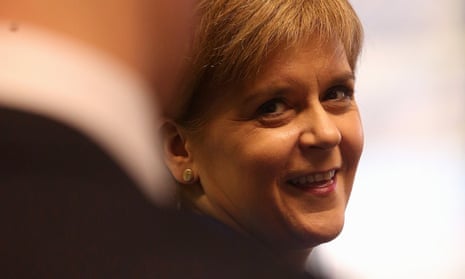


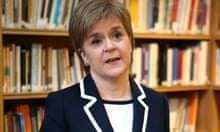
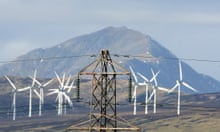
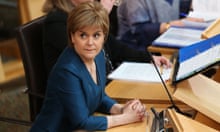


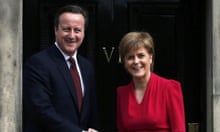
Comments (…)
Sign in or create your Guardian account to join the discussion